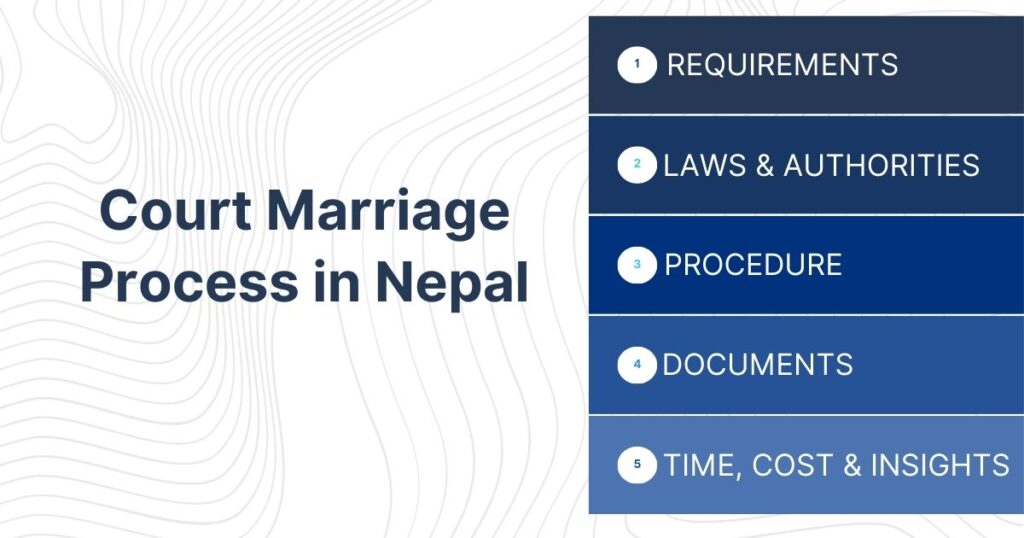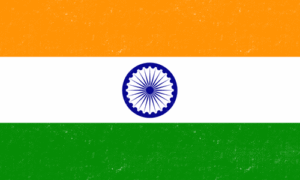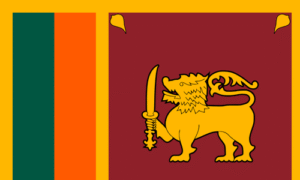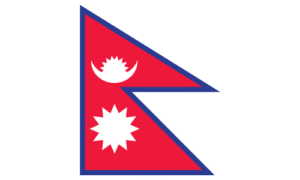Updated on: November 1, 2026
How to Register Marriage in Court in Nepal?
Introduction to Court Marriage in Nepal
The court marriage process in Nepal provides a legally recognized union without traditional ceremonies. Governed by the Civil Code 2017 (2074), specifically Numbers 67-84, this process offers a straightforward path to legal marriage registration. Court marriage in Nepal has become increasingly popular among young couples seeking simplicity, legal security, and international recognition. Whether you’re Nepali citizens, a mixed-nationality couple, or both foreigners, understanding the court marriage process in Nepal is essential for ensuring your union is properly documented under Nepali law. This comprehensive guide addresses all aspects of legal marriage Nepal procedures, including bibaha darta requirements, costs, timelines, and special considerations for NRNs and foreigners.
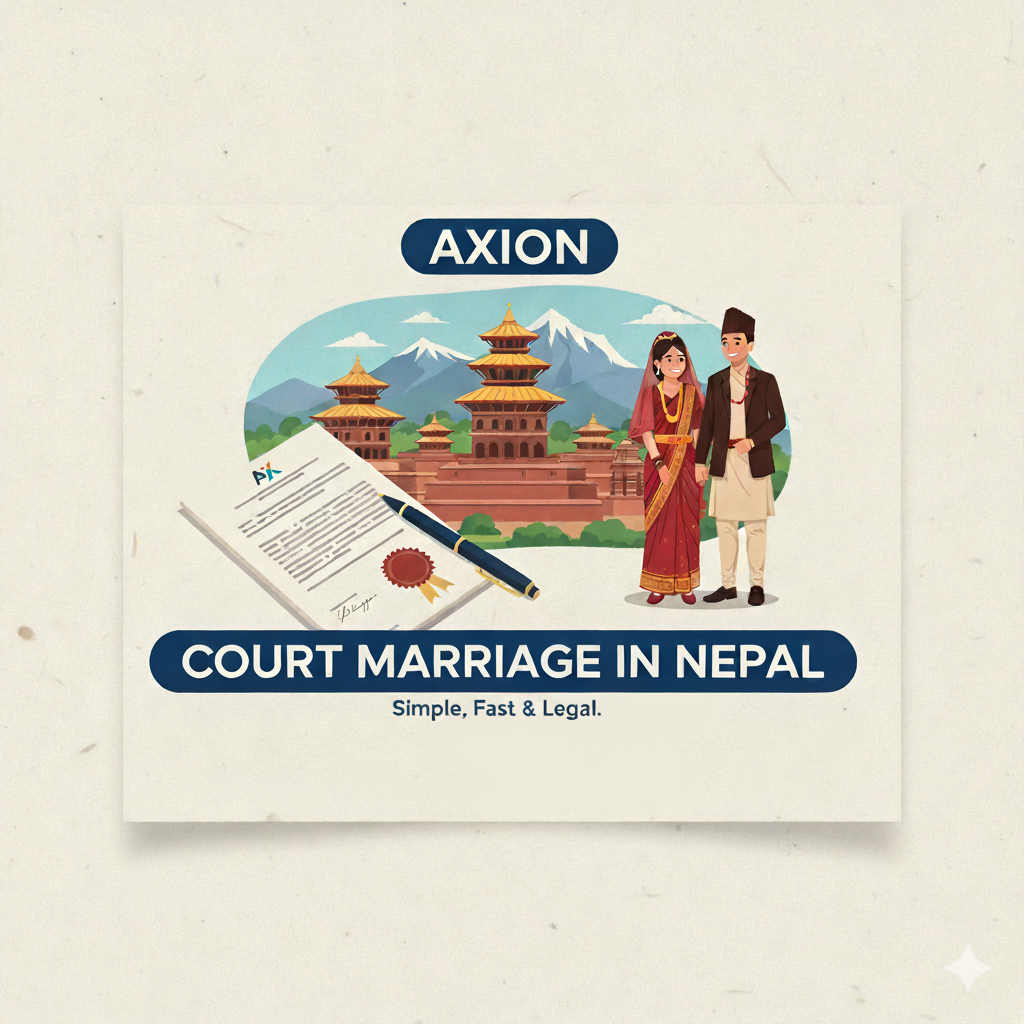
For Court marriage in Nepal, Find the best and fastest court marriage lawyer and best court marriage service. Contact us for hassle free and Confidential legal service at +977- 9709090127
Legal Framework for Court Marriage in Nepal
The court marriage process in Nepal operates under strict legal guidelines established by the National Civil Code, 2017 (2074). The relevant provisions include:
- Section 67: Defines marriage as a consensual union between a man and woman
- Section 68: Establishes the minimum age requirement of 20 years for both parties
- Section 69: Prohibits marriage between close relatives
- Section 70: Outlines eligibility criteria for court marriage in Nepal
- Number 73: Makes marriage registration compulsory through court, ward office, or embassy
- Section 76(2): Allows NRNs to register at Nepal Embassy or Consulate
- Section 77: Covers marriage registration through Nepali embassies abroad
These provisions ensure that court marriage in Nepal is conducted with proper legal oversight and documentation. The Civil Code 2017 standardizes marriage procedures across Nepal, providing consistency whether you register through court marriage, ward office, or diplomatic channels.
Eligibility Criteria for Court Marriage in Nepal
Before proceeding with the court marriage process in Nepal, couples must meet these mandatory requirements:
Table: Eligibility Criteria for Court Marriage in Nepal
| Requirement | Description | Legal Reference |
|---|---|---|
| Age Requirement | Both parties must be at least 20 years old | Section 68 |
| Marital Status | Both must be unmarried, divorced, or widowed | Section 70 |
| Consent | Both parties must willingly accept each other as spouses | Section 67 |
| Relationship | Cannot be within prohibited degrees of relationship | Section 69 |
| Mental Capacity | Both must be of sound mind | Section 70 |
Additionally, foreigners must provide proof of 15 days’ residence in Nepal before applying for court marriage registration. This residency requirement ensures proper jurisdiction and prevents rushed decisions without adequate consideration.
Step-by-Step Court Marriage Process in Nepal
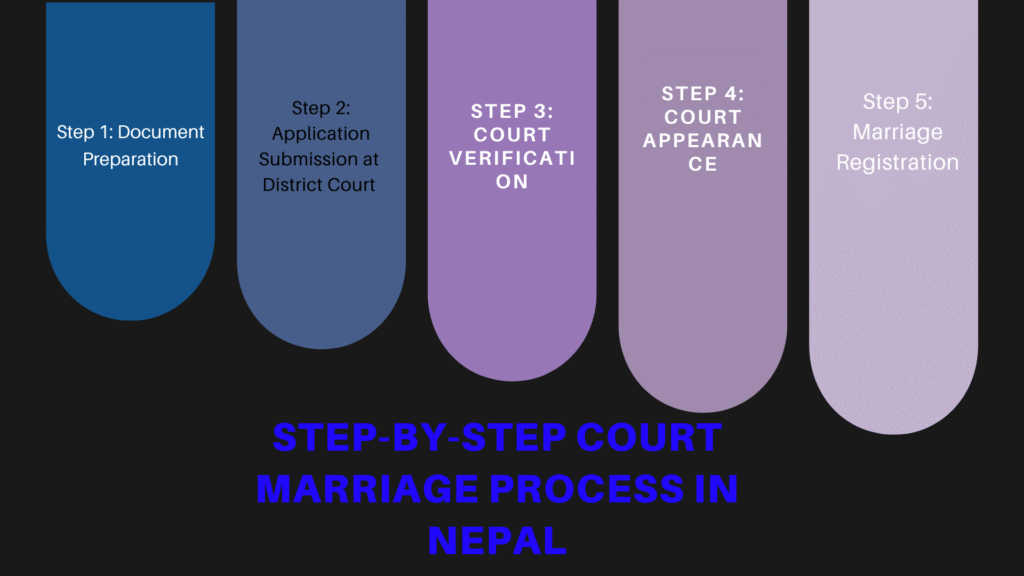
The court marriage process in Nepal follows a structured sequence that ensures legal compliance while maintaining efficiency. Below is the detailed procedure:
Step 1: Document Preparation
All required documents must be prepared and verified before submission. This includes:
- Photocopies of citizenship certificates or passports
- Passport-sized photographs (4 copies each)
- Single status certificates from respective ward offices
- No Objection Letters (for foreigners)
Step 2: Application Submission
The application is submitted to the District Court having jurisdiction over your residence. The application form must be completed accurately with all supporting documents attached.
Step 3: Court Verification
The court verifies all documents and information provided. This process typically takes 1-2 days for Nepali couples and 2-3 days when foreigners are involved.
Step 4: Court Appearance
Both parties must appear before the judge with their witnesses. The judge conducts a brief interview to confirm voluntary consent and eligibility.
Step 5: Marriage Registration
Upon successful verification, the court registers the marriage and issues a temporary certificate. The official marriage certificate Nepal is typically issued within 15 days.
Step 6: Certificate Collection
The final marriage certificate is collected from the court. This document serves as legal proof of marriage recognized nationwide and internationally.
Table: Timeline for Court Marriage in Nepal
| Applicant Type | Total Time Required | Key Steps |
|---|---|---|
| Nepali-Nepali Couple | 2-4 days | Document prep → Submission → Verification → Registration |
| Foreign-Nepali Couple | 16-22 days | 15-day residence → Embassy NOC → Translation → Submission |
| NRN Couple | 3-5 days | Document prep → Embassy verification → Submission |
What are the Required Documents for Court Marriage in Nepal?
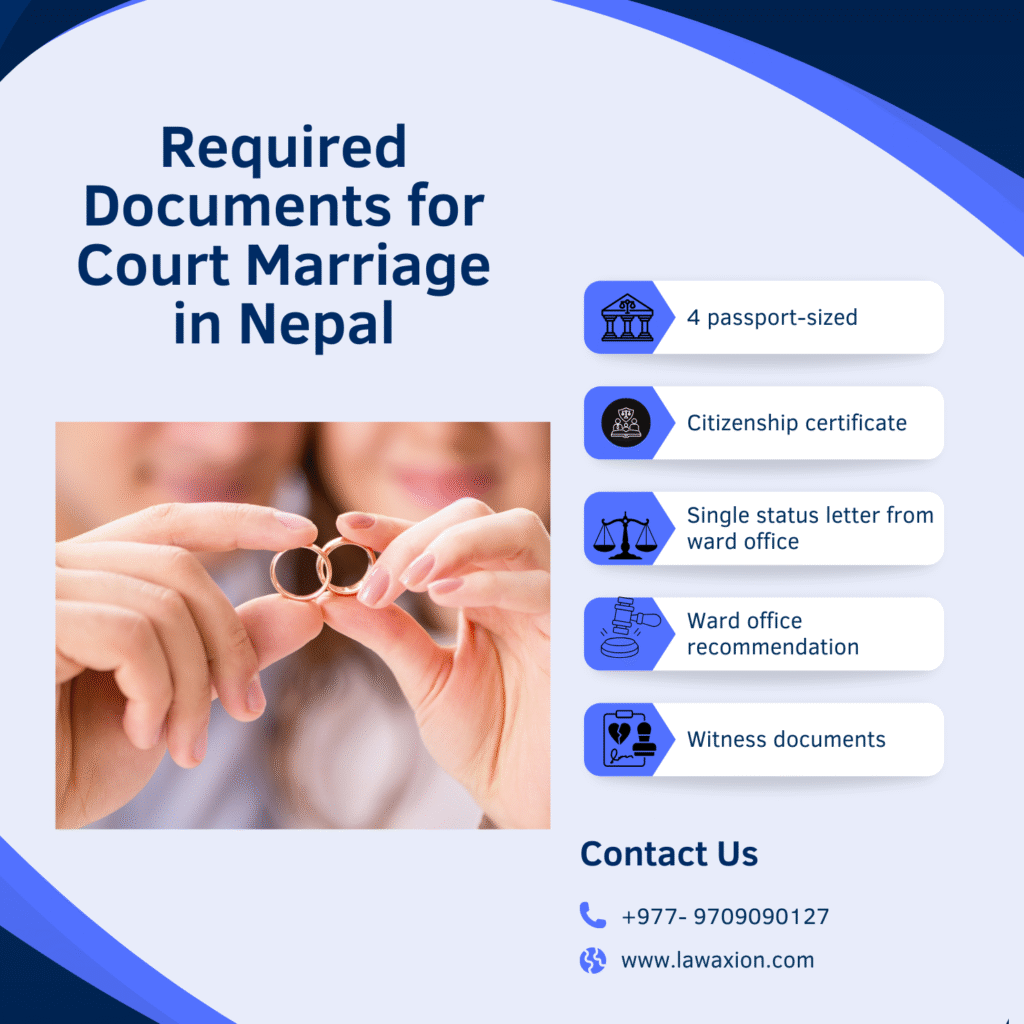
The court marriage process in Nepal requires specific documentation varying by applicant type. Below is a comprehensive breakdown:
Table: Documents Required for Court Marriage in Nepal
| Document Type | Nepali Citizens | Foreigners | NRNs |
|---|---|---|---|
| Photographs | 4 passport-sized | 4 passport-sized | 4 passport-sized |
| Age Proof | Citizenship certificate | Passport + birth certificate | Passport + citizenship |
| Marital Status | Single status letter from ward office | NOC from embassy | Single status letter |
| Residency Proof | Ward office recommendation | 15-day residence proof | Embassy verification |
| Additional | Witness documents | Translated marriage laws | Legalized documents |
For foreigners, additional requirements include:
- No Objection Letter from respective embassy or consulate in Nepal
- Proof of residence in Nepal for minimum 15 days
- Translation of home country’s marriage laws into Nepali
NRNs must provide:
- No-Objection Letter from respective Embassy or Consulate
- Proof of legal status in country of residence
- Document verification from Nepali diplomatic mission
Cost and Fees Structure for Court Marriage in Nepal
The court marriage process in Nepal involves various costs that couples should budget for in advance:
Table: Fee Structure for Court Marriage in Nepal
| Fee Type | Nepali Couple | Foreigner Involved | NRN Couple |
|---|---|---|---|
| Court Fee | NPR 500 | NPR 500 | NPR 500 |
| Document Preparation | NPR 200-500 | NPR 1,000-2,000 | NPR 500-1,000 |
| Translation Services | Not required | NPR 3,000-5,000 | NPR 2,000-4,000 |
| Notary/Legalization | NPR 200-500 | NPR 1,000-2,000 | NPR 500-1,500 |
| Miscellaneous | NPR 100-300 | NPR 500-1,000 | NPR 300-800 |
| Total Estimated Cost | NPR 1,000-1,800 | NPR 5,000-10,500 | NPR 3,300-7,800 |
The basic court fee is standardized at NPR 500 across all districts. However, additional costs arise from document preparation, translation services (for foreigners), and miscellaneous expenses. Foreigners should budget significantly more due to translation and notarization requirements.
Which is Fastest option Court Marriage or Ward Office Marriage Registration in Nepal?
While both methods provide legal recognition, court marriage and ward office registration serve different purposes:
Table: Comparison of Court Marriage and Ward Office Registration
| Aspect | Court Marriage | Ward Office Registration |
|---|---|---|
| Purpose | Legal solemnization of marriage | Registration of already performed marriage |
| Time Required | 2-4 days (Nepalis) | Up to 2 days |
| Ceremony | Performed before judge | No ceremony, documentation only |
| Cost | NPR 1,000-1,800 | NPR 500-1,000 |
| Recognition | Immediate legal validity | Requires prior traditional ceremony |
| Foreigner Applicability | Yes | Limited |
Court marriage is preferred for couples seeking direct legal solemnization without traditional rituals, while ward office registration is suitable for those who have already undergone traditional ceremonies and need legal documentation.
Special Guide for Foreigners and NRNs Court Marriage Process in Nepal.
For Foreigners
Foreigners seeking court marriage in Nepal must follow additional procedures:
- Establish 15-day residence in Nepal
- Obtain No Objection Letter from respective embassy
- Translate all documents into Nepali
- Verify home country marriage laws compatibility
For NRNs
NRN court marriage involves special considerations:
- Document verification through Nepali embassies abroad
- Compliance with both Nepali and host country laws
- Physical presence required during registration
- Additional documentation for legal status verification
Section 76(2) of the Civil Code specifically provides for marriage registration through Nepali embassies or consulates for NRNs residing abroad.
Common Challenges and Solutions
Challenge 1: Document Delays
Solution: Start document preparation at least 2 weeks in advance. For foreigners, begin the process immediately upon arrival in Nepal.
Challenge 2: Language Barriers
Solution: Engage certified translators for all foreign documents. Most courts require Nepali translations of foreign documents.
Challenge 3: Residency Requirements
Solution: Plan your arrival in Nepal at least 15 days before intended marriage date for foreigners.
Challenge 4: Embassy Procedures
Solution: Contact your embassy immediately upon arrival to understand NOC requirements and processing times.
Frequently Asked Questions (FAQ)
What is the minimum age for court marriage in Nepal?
Both parties must be at least 20 years old under Section 68 of the Civil Code.
Can foreigners do court marriage in Nepal?
Yes, foreigners can marry in Nepal provided they meet residency requirements and obtain necessary documentation.
How long does court marriage take in Nepal?
For Nepali couples: 2-4 days; for foreign-Nepali couples: 16-22 days.
What is the cost of court marriage in Nepal?
Basic court fee is NPR 500, with total costs ranging from NPR 1,000-10,500 depending on applicant types.
Is physical presence required for court marriage?
Yes, both parties must be physically present during the registration process.
Can NRNs register marriage from abroad?
Yes, Section 76(2) allows NRNs to register at Nepal Embassy or Consulate.
What documents do foreigners need for court marriage?
Foreigners need passport, NOC from embassy, proof of residence, and translated documents.
Is court marriage legally recognized internationally?
Yes, with proper attestation, court marriage certificates from Nepal are recognized globally.
Can we register court marriage without witnesses?
No, witnesses are required to validate the marriage process.
What if documents are not in Nepali?
All foreign documents must be translated into Nepali by certified translators.
Conclusion and Next Steps
The court marriage process in Nepal provides a legally secure, efficient, and internationally recognized path to marital union. Whether you’re a young Nepali couple, NRNs, or foreigners, understanding the procedures ensures a smooth registration experience. Court marriage in Nepal offers advantages of legal certainty, cost-effectiveness, and simplified documentation compared to traditional ceremonies.
For personalized assistance with your court marriage in Nepal, including document preparation, translation services, and legal guidance, contact our experienced team. We specialize in helping young couples, NRNs, and foreigners navigate the court marriage process efficiently and stress-free.
💡 Pro Tip: Start document preparation at least 2 weeks in advance to avoid delays. For foreigners, arrive in Nepal at least 15 days before your intended marriage date to meet residency requirements.
This guide is regularly updated to reflect the latest legal requirements and procedures for court marriage in Nepal. For the most current information, consult with legal professionals specializing in marriage registration Nepal.
READ MORE:
- How to Get Married in Nepal
- Can a Nepali Marry a Foreigner?
- Translation of Foreign Marriage Acts in Nepal
- Court Marriage for Indians in Nepal
- Court Marriage of NRN in Nepal
- Court Marriage of Punjabi Nationals in Nepal
- How to Do Court Marriage in Kathmandu
- Where to Go for Court Marriage in Nepal
- Legal Age for Court Marriage in Nepal
- Obtaining Marriage Certificate in Nepal
- Marriage Registration in Nepal with Foreigner
- Online Court Marriage in Nepal
- Online Marriage Registration in Nepal
- Court Marriage Lawyer in Nepal
- Court Marriage Process in Nepal

